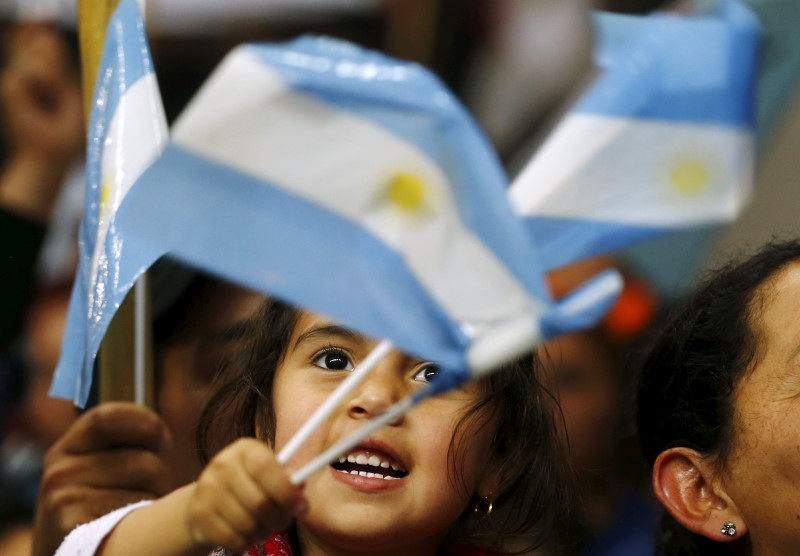(Bloomberg) -- Argentine bonds tumbled to new lows as the central bank’s efforts to support the peso drain foreign-currency reserves while a lifeline from the International Monetary Fund hangs in the balance.
Sovereign bond prices fell as much as 7%, with euro-denominated notes trading around 40 cents per euro and the dollar-denominated century bonds at the weakest level on record near 43 cents on the dollar. The peso weakened as much as 4.2% before paring losses as officials intervened in the market.
Investors are taking an increasingly dim view of the country just as a team from the IMF visits Buenos Aires to determine whether to disburse the next tranche of its $56 billion credit line. A refusal could spark renewed capital flight and bring about default. An agreement would enable Argentina to live to fight another day. The team’s recommendation should be known within the next few weeks.
“Argentina needs the $5.3 billion disbursement to make debt payments by year-end,” said Carolina Gialdi, a senior fixed-income strategist at BTG Pactual Argentina in Buenos Aires. “If they don’t disburse, the government will need to use international reserves to repay dollar debt.”
Yet reserves are already falling fast as people pull their money out of the country, with the cache down more than $10 billion over the past month to $57.5 billion.
Argentina’s credit default swaps imply an 89% probability of a default within five years, according to CMA data.
Running Mate
The central bank is seeking to limit demand for dollars by telling financial institutions to hold off on peso loans to exporters, who would then buy greenbacks, according to a statement Wednesday.
More drama was inserted into the market Wednesday morning when President Mauricio Macri’s running mate in the October election said the government is considering measures to halt capital flight. Argentina isn’t planning to announce any new economic measures in the short term, according to the Economy Ministry’s press office.
“I am convinced that they are going to take measures that provide stability to the economy and fundamentally to stop dollars flowing out,” Miguel Angel Pichetto told Radio Metro.
Pichetto added that he believed the opposition was lobbying to block the disbursement from the IMF. Opposition candidate Alberto Fernandez criticized the IMF accord yesterday, saying the Fund and Macri were now responsible for getting the country out of the economic crisis.
Central Bank
The central bank is taking increasingly drastic action to defend the peso. It sold $367 on the currency market Wednesday and $302 million the day before, according to a people with knowledge of the matter.
While the markets tumble, Argentines are taking to the streets. Tens of thousands joined protests across the country on Wednesday demanding the government take measures to mitigate the impact of the economic crisis.
The peso has slumped more than 20% since the opposition unexpectedly routed Macri in a primary election on Aug. 11 ahead of the election proper on Oct. 27.
“It appears that the political harmony created by an implicit agreement between Macri and Fernandez is fading fast,” Citigroup (NYSE:C) strategists including Dirk Willer and Kenneth Lam wrote on a Wednesday report. “Volatility is going to be high into the election.”
(Updates with dollar auctions in the 11th paragraph.)
